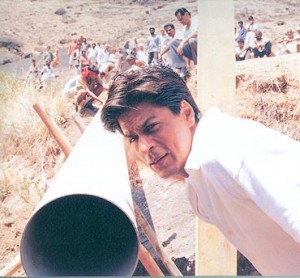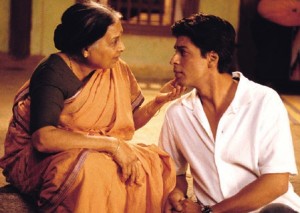Set in modern India, Swades (Our country) is a film that tackles the issues facing the citizens of this nation on a grass roots level. A country that is grappling with problems that development throws up, the India depicted in Swades is colorful, heterogeneous and complex, with people of diverse cultures and attitudes. Mohan Bhargava (Shah Rukh Khan), a bright young scientist working as a project manager in NASA, returns to on a quest to find his childhood nanny. In his attempts to persuade Kaveri Amma (Kishori Ballal), the symbol to him of motherhood and family, to return to America with him, he gets drawn into the life of a village called Charanpur and finds himself searching for answers to the questions of progress and development that the village is facing. His curiosity is piqued by Gita (Gayatri Joshi), an admirable young woman teaching in the village primary school, who chooses to live here despite problems like casteism, prejudice and a lack of basic amenities.
The film uses the contrast between the highly developed world of NASA, which has been at the forefront of advances in space research, and this world back home in India, which is at the crossroads of development. What was a simple mission, prompted by nostalgia and affection, turns into a journey into the heartland of rural India, both literally and metaphorically. His quest becomes the journey that every one of us goes through in the search of the metaphysical and elusive place called home.
Swades is a film that shows the beauty of India, the rich culture and the kindness, but it also shows that India still has a long way to go. It brings issues to the foreground like arranged marriage, dowry, child marriage, unemployment, how woman are perceived, failing of the Government when it comes to simple needs like education and electricity in villages. This upcoming economy with so much potential needs to step up and take charge.
Here I would like to focus on one of the best scenes in the film, a discussion between Mohan and Gita, which is even relevant in today’s time, nine years after the release of the movie. Has anything changed, when you read the following?
In a scene before the discussion starts, Gita said no to an arranged marriage, even though the boy has a good job and is educated, because their viewpoint of a woman’s worth is not to her liking.
In this scene, Gita explains why she rejected an arranged marriage. The family of the boy wanted her to stop working after marriage because a woman is supposed to stay at home and look after the family once married. According to the boy, a woman’s hands are full just with the household chores. Gita does not agree. The family says that in their family woman do not work outside of the house. They fail to understand why a woman would want to work after marriage. Gita says: “And what if I say the same to your son?” She explains that her parents too have brought her up with equal love and affection and they expect her to live her life with self-esteem, independence and self-reliance. She points out that if their son has a desire to be something in life, to make a mark in society then why can’t woman have the same desire. She points out that a woman is not only in the world to wear bangles and sit at home. After marriage, aren’t the house and children as much a responsibility of the man as the woman? Why can’t the husband and wife work as a team? Why should one of them sacrifice more than the other?
Kaveri Amma says that after marriage you can change this thinking, but Gita is confident that this guy and his way of thinking cannot be changed. She even feels that once they have agreed to the marriage they would have asked for dowry as well.
Then Mohan enters the conversation and says “This thinking is imbedded in our culture & tradition and it hampers the nation.”
The discussion between the two continues, heats up and turns into a serious discussion about India and the Government.
Gita: “Excuse me. Without culture and tradition the country would be left with no soul.”
Kaveri Amma: “But Mohan, we are not talking about the country.”
Mohan: “I know, Kaveri Amma, but it’s all connected, isn’t it? What is this soul you talk about Gita? We are plagued with problems. Will you disagree when I say that illiteracy is rampant? That we have administrative problems. We are yet under-developed.”
Kaveri Amma: “That’s true! Illiteracy and poverty go hand in glove.”
Mohan: “Kaveri Amma, your village has not even got electricity yet. Caste discrimination, overpopulation, unemployment and corruption, our state of affairs is pathetic.”
Gita: “You have drifted from our topic. But since you’ve brought this up, let me tell you the Government is trying to find solutions for these problems.”
Mohan: “Yes!Yes! We’ll see how much good solutions will bring. The infrastructure that the Government has is not enough to cope with even ¼ of the existing population. The Government has always failed in satisfying the peoples’ needs.”
Gita: “The Government is making policies, making efforts.”
Mohan: “What do you mean by making efforts? Just to make resolutions and collect funds for them is that where the Government works’ ends? Whether this money even reaches the grassroots level, whether the common man benefits or not from the resolutions, are they not responsible for that as well?”
Gita: “Yes they are.”
Mohan: “Then…”
Gita: “But what do you think the Government is, after all? The Government is a system, of which the public also is a part of. You, Me, this village… all of us! Now if the system is lacking in certain things, then to rectify its weaknesses is our responsibility as well.”
Kaveri Amma: “God helps only those who help themselves.”
Mohan: “Yes Kaveri Amma, but things are not going to change here. Because no one wants to change.”
Gita: “It’s easy for you to criticize. But are you doing anything about it? No!”
Mohan: “Excuse me. At least, unlike you, I am not defending the Government. I am building satellites to help technology advance. For everyone, for mankind.”
Gita: “But you are doing it all over there. I’m doing all that I can here, at the village, grassroot level. I’m trying to make this a better place.”
Mohan: “Gita, you too are a typical Indian. You Indians can’t take criticism.”
Kaveri Amma: “You Indians?”
Mohan: “Sorry, I mean… We Indians.”
Gita: “Anyway, we are aware that not much has changed in our country in a long time. But still I want to try and make a difference. You have given up all hope.”
Mohan: “No I haven’t.”
Swades is a film that explores the contrasts between the high-tech world of NASA and the low-tech villages. It’s about making a change and as large parts of the Indian population are youngsters, they are the ones that should make the change for the next generation of people.












